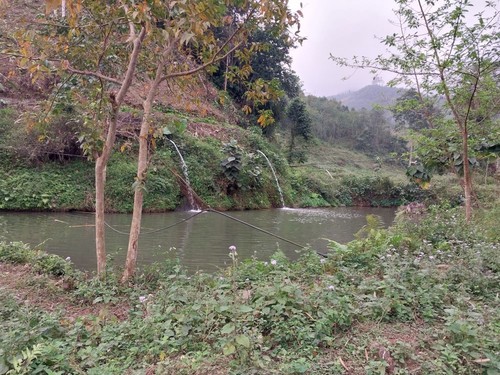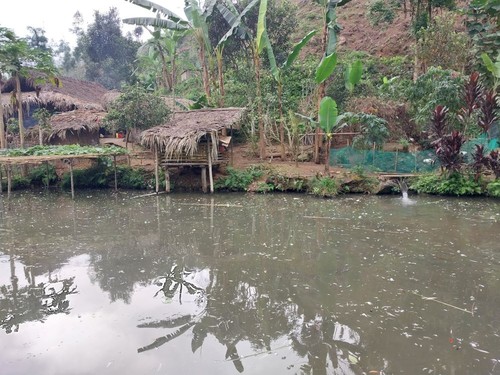 Clean water from streams is pumped into the pond. (Photo: VOV) Clean water from streams is pumped into the pond. (Photo: VOV) |
The phoenix barb is a species native to the Chay River. For several decades, people in Bao Yen have been raising this type of fish at home. They say a phoenix barb living in a clean environment can live up to 50 years and weigh up to 20kg.
As this kind of fish prefers clear water with a lot of oxygen and little mud, farmers must direct clean water from a stream into their ponds and pump the water to create oxygen for the fish.
Raising phoenix barbs is considered a good business, because they can be fed agricultural waste and leaves that are easy to find and easy to grow.
Hoang Van Dat of Pit hamlet in Luong Son commune said farming phoenix barbs is very easy, adding that they mainly eat cassava leaves.
Dat told VOV, “Grass carp sell for more than 4 USD a kilo, but the price of phoenix barbs varies. A 2-kilo fish sells for about 8 USD a kilo. A 3-kilo fish sells for more than 12 USD a kilo. Thanks to government investment and the commune’s help in checking the pond water, local farmers feel confident about adopting this model.”
 Phoenix barbs are mainly fed cassava leaves. (Photo: VOV) Phoenix barbs are mainly fed cassava leaves. (Photo: VOV)
|
Luong Son commune is piloting a model of raising phoenix barbs and doing on-site breeding to develop the species.
The program is overseen by the provincial aquatic breeding center and the Agriculture and Rural Development Section of Bao Yen district. Fish-raising households receive breeding fish and technical guidance and training from the center’s experts.
Hoang Van Chi of Pit hamlet, a participant of the phoenix barb program, said, “After I registered to participate in this program, I received a state investment. I’m very glad I joined.”
According to Hoang Van Hung, Deputy Chairman of the People’s Committee of Luong Son commune, over the past two years, the commune has asked for direction from the district and invited authorities to work on the project.
“We’ll do an evaluation after deploying it for a while. If the model works well, we’ll expand it on a large scale,” said Hung.
Luong Son commune has 20 hectares of aquaculture, of which the phoenix barb farming area takes up about 1 hectare. Several Bao Yen families have now converted their unprofitable rice fields to raising specialty fish.
Of the 300 households in Bao Yen district engaged in raising phoenix barbs, Luong Son commune has the most – 100 households – producing 10 tons of fish per year. Nguyen Van Nhat, Deputy Chairman of the district People's Committee, said, “Bao Yen’s phoenix barbs have been designated a commodity product. As the fish are very picky about their water environment, we’ve instructed Luong Son and Phuc Khanh commune to choose households living near a clean water source to deploy the model.”
The phoenix barbs of Luong Son commune will be certified as an OCOP product, which should help boost Bao Yen district’s agricultural and tourism sectors.